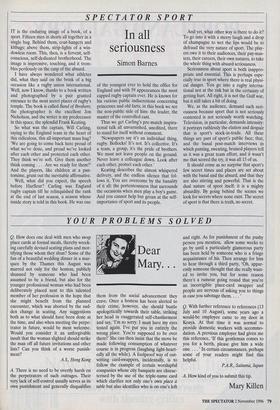YOUR PROBLEMS SOLVED
Dear Mary.. .
Q. How does one deal with men who swap place cards at formal meals, thereby wreck- ing carefully devised seating plans and mor- tifying those whom they shun? Some of the fun of a beautiful wedding dinner in a mar- quee by the Thames this August was marred not only for the hostess, publicly shunned by someone who had been assumed to be a friend, but also for the younger professional woman who had been deliberately placed next to this talented member of her profession in the hope that she might benefit from the planned encounter, which was aborted by the sud- den change in seating. Any suggestions both as to what should have been done at the time, and also when meeting the perpe- trator in future, would be most welcome. Would you consider it an unforgivable insult that the woman slighted should strike the man off all future invitations and other lists? Can you think of a worse punish- ment?
A.S., Hong Kong A. There is no need to be overtly harsh on the perpetrators of such outrages. Their very lack of self-control usually serves as its own punishment and generally disqualifies them from the social advancement they crave. Once a hostess has been alerted to their crime, however, she should bustle apologetically towards their table, striking her head in exaggerated self-chastisement and say, 'I'm so sorry. I must have my eyes tested again. I've put you in entirely the wrong place. You're supposed to be over there!' She can then insist that the move be made following consumption of whatever course is in progress (laughing light-heart- edly all the while). A foolproof way of out- witting card-swappers, incidentally, is to follow the example of certain worshipful companies whose city banquets are charac- terised by the use of the triple-name card which clarifies not only one's own place a table but also identifies who is on one's left and right. As for punishment of the pushy person you mention, allow some weeks to go by until a particularly glamorous party has been held by someone who is a fringe acquaintance of his. Then arrange for him to hear through a third party, 'Oh, appar- ently someone thought that she really want- ed to invite you, but for some reason there's a rumour going round that you're an incorrigible place-card swapper and people are nervous of asking you to things in case you sabotage them, . . . '
Q. With further reference to references (13 July and 10 August), some years ago a would-be employee came to my door in Kenya. At that time it was normal to provide domestic workers with accommo- dation. A previous employer had given me this reference, 'If this gentleman comes to you for a berth, please give him a wide one. . . . ' In certain circumstances, perhaps some of your readers might find this helpful.
PA.R, Saitama, Japan A. How kind of you to submit this tip.
Mary Killen


















































































 Previous page
Previous page